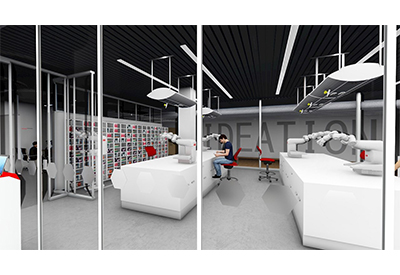ABB Robotics to develop solutions for the Hospital of the Future

July 11, 2019
- ABB to install advanced collaborative robotics for medical laboratories and hospitals, starting with new healthcare hub at Texas Medical Center in Houston, US, in October.
- New facility at Texas Medical Center’s innovation campus to focus on non-surgical medical Robotics systems.
- Global market estimated to reach nearly 60,000 non-surgical medical robots by 2025, almost quadrupling vs. 2018.
ABB announced that it will introduce collaborative robots to medical laboratories as it opens a new healthcare hub at the Texas Medical Center (TMC) innovation campus in Houston, Texas.
The facility will be ABB’s first dedicated healthcare research center when it opens in October 2019. ABB’s research team will work on the TMC campus with medical staff, scientists and engineers to develop non-surgical medical robotics systems, including logistics and next-generation automated laboratory technologies.
Sami Atiya, President of ABB’s Robotics and Discrete Automation business said, “The next-generation laboratory processes developed in Houston will speed manual medical laboratory processes, reducing and eliminating bottlenecks in laboratory work and enhancing safety and consistency. This is especially applicable for new high-tech treatments, such as the cancer therapies pioneered at the Texas Medical Center, which today require manual and time-consuming test processes.”
Today, a limiting factor to the number of patients who can be treated is the need for highly skilled medical experts who spend a large part of their day doing repetitive and low value tasks, such as preparing slides and loading centrifuges. Using robots to automate these tasks will enable medical professionals to focus on more highly skilled and productive work, while ultimately helping more people to receive treatment through dramatically speeding the testing process.
ABB has analyzed a wide range of current manual medical laboratory processes and estimates that 50% more tests could be carried out every year using automation, while training robots to undertake
repetitive processes will reduce the need for people to do tasks which cause repetitive strain injury (RSI).
As the world population ages, countries are spending an increasingly larger proportion of their GDP on healthcare. In addition to improving the quality of patient care, increasing healthcare efficiency through automation can ease some of the societal, political and financial challenges that this will cause. The market for non-surgical medical robots is estimated to reach nearly 60,000 by 2025 with the market almost quadrupling vs. 2018, according to an internal ABB research.
ABB’s collaborative robots, which already operate in food and beverage laboratories worldwide, are well suited to medical facilities as they don’t require safety fences to operate safely and efficiently alongside people. The robots will undertake a range of repetitive, delicate and time-consuming activities including dosing, mixing and pipetting tasks as well as sterile instrument kitting and centrifuge loading and
unloading.
Houston is a focal point for medical technology research globally and the TMC innovation ecosystem is the ideal location for ABB’s new healthcare hub. A 20-strong team from ABB Robotics will work in the new 5,300 sq ft (500m2) research facility, which includes an automation laboratory and robot training facilities, as well as meeting spaces for co-developing solutions with innovation partners.
“With this exciting partnership, Texas Medical Center continues to push the boundaries of innovative collaboration with cutting-edge industry partners by establishing TMC as the epicenter for ABB Robotics’ entry into the healthcare space,” said Bill McKeon, President & CEO of Texas Medical Center. “Operating a city within a city that sees 10 million patients on an annual basis, it is essential to prioritize efficiency, and precision and to develop processes that are easily repeatable in nature. By bringing ABB into the fold at TMC Innovation with this first-of-its-kind R&D facility for creating robotics solutions in healthcare, TMC is emphasizing its commitment to doing just that.”
“We are proud to co-develop collaborative robotics systems for the Hospital of the Future with one of the world’s most advanced partners and to test them in real-world laboratories to ensure they add value to healthcare professionals, driving innovation and transforming how medical laboratories operate worldwide,” added Atiya. “A key element of ABB’s long-term growth strategy is to continue to invest and innovate in service robotics, bringing our automation expertise to new areas such as healthcare and building on our automotive and electronics sectors business.”
Find out more HERE.







